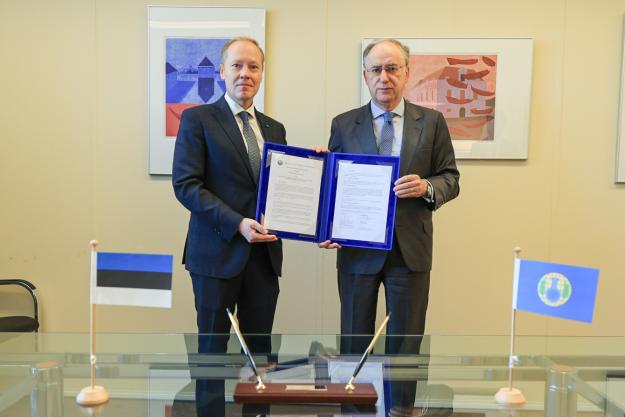
H.E. Mr Paul Teesalu, Permanent Representative of the Republic of Estonia, and Ambassador Fernando Arias, OPCW Director-General.
THE HAGUE, Netherlands—7 October 2025— The Republic of Estonia has made a voluntary contribution of €10,000 to the Organisation for the Prohibition of Chemical Weapons (OPCW) to support its ongoing work in the Syrian Arab Republic.
The funds will support OPCW’s ongoing efforts to uncover the full extent and scope of Syria’s chemical weapons programme and ensure its complete elimination amid the country’s evolving political landscape. It will also aid in investigating allegations of chemical weapons use and identifying perpetrators, in line with the Chemical Weapons Convention (CWC), relevant decisions of the OPCW’s policy-making organs and United Nations Security Council resolutions.
The voluntary contribution was formalised on 24 September 2025 in a signing ceremony held between the Ambassador, Permanent Representative of Estonia to the OPCW, H.E. Mr Paul Teesalu and OPCW Director-General, Ambassador Fernando Arias at the OPCW’s Headquarters in The Hague.
Ambassador Teesalu stated: “For more than 10 years, the OPCW has had to tackle the challenge of Syrian chemical weapons. With the cooperation of the new Syrian authorities, it is now possible to bring this dossier to a close, marking a significant step towards a world free of chemical weapons. Estonia is proud to contribute to the Trust Fund for Syria Missions, supporting the work of the OPCW — the most successful global disarmament organisation.”
Director-General Arias remarked: “Estonia’s contribution will strengthen the OPCW’s work in Syria, helping to eliminate its chemical weapons programme and ensure accountability for chemical weapons use. It reflects Estonia’s steadfast commitment to our shared mission of a world free of chemical weapons.”
“To continue its work in Syria and carry out its future missions, the Technical Secretariat relies on the continuous financial support from States Parties, such as the contribution from Estonia today,” he emphasised.
Background
Estonia has been an active member of the OPCW since 1999. To date, Estonia has contributed a total of €72,000 to OPCW trust funds, including prior support for the Trust Fund for Syria Missions and the Trust Fund for the Centre for Chemistry and Technology.
In February 2025, the OPCW Director-General, accompanied by a high-level delegation from the Technical Secretariat, visited Damascus and met with Syria’s interim President Ahmad al-Sharaa and caretaker Foreign Minister Asaad Hassan al-Shaibani. During the visit, Syria, at the highest level, expressed its commitment to achieving full compliance with the Chemical Weapons Convention and to work towards the full implementation of all its obligations under the treaty.
To ensure Syria’s compliance with its obligations under the CWC, the OPCW currently implements three distinct mandates related to Syria’s chemical weapons programme. These include verifying the accuracy and completeness of Syria’s chemical weapons declaration, establishing the facts surrounding allegations of the use of toxic chemicals as weapons, and identifying those responsible for the use of chemical weapons in the country.
As the implementing body for the Chemical Weapons Convention, the OPCW, with its 193 Member States, oversees the global endeavour to permanently eliminate chemical weapons. Since the Convention’s entry into force in 1997, it is the most successful disarmament treaty eliminating an entire class of weapons of mass destruction.
In 2023, the OPCW verified that all chemical weapons stockpiles declared by the 193 States Parties to the Chemical Weapons Convention since 1997 — totalling 72,304 metric tonnes of chemical agents — have been irreversibly destroyed under the OPCW’s strict verification regime.
For its extensive efforts in eliminating chemical weapons, the OPCW received the 2013 Nobel Peace Prize.
